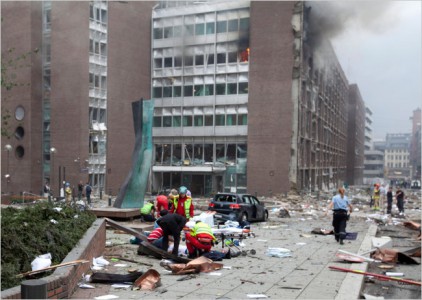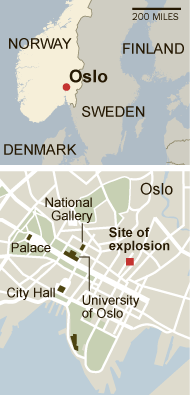
A loud explosion shattered windows Friday at the government headquarters in Oslo which includes the prime minister's office, injuring several people. Prime Minister Jens Stoltenberg is safe, government spokeswoman Camilla Ryste told The Associated Press.
By ELISA MALA and J. DAVID GOODMAN
Published: July 22, 2011
OSLO — Powerful explosions shook central Oslo on Friday afternoon, blowing out the windows of several government buildings, including one housing the office of the Norwegian prime minister. Media reports said that at least two people were killed and several more injured; a spokeswoman for the prime minister, Jens Stoltenberg, said he was “safe and not hurt.”
Shortly after the apparent bomb attack, a man dressed as a police officer opened fire on a youth political meeting on the island of Utoya in the Oslo fjord, about 25 miles from the city, the police said. There were initial reports that Prime Minister Stoltenberg was scheduled to attend the meeting.
“The situation’s gone from bad to worse,” said Runar Kvernen, spokesman for the National Police Directorate under the Ministry of Justice and Police.As fear spread through the capital, the police moved to lock down a wide area of the city center, where the streets were already nearly deserted.
Stunned office workers and civil servants in the vicinity of the bombed building said that at least two explosions were heard in quick succession, as the sound of the blasts echoed across the city. Giant clouds of light-colored smoke rose hundreds of feet into the air over the city as a fire burned in one of the damaged structures, a six-story office building that houses the oil ministry.
The police said that the initial blast occurred at around 3:20 p.m. local time. “We think there was more than one blast,” Mr. Kvernen said. He said he could not confirm the number of casualties.
The cause of the explosions was not immediately clear, but in front of the main government building, the mangled wreckage of a car was visible flipped on its side, and a large area of the sidewalk appeared heavily damaged.
Photos and television footage showed windows blown out in the 17-story office building across the street from the oil ministry, and the street and plaza areas on each side were strewn with glass and debris. The police said they were on heightened alert as they combed through the debris in search of clues.
“This is very serious,” Prime Minister Stoltenberg told the Norwegian broadcaster, TV2, by telephone, but added it was still too early to call the blast a terror attack.
At about the time of his television appearance, Norwegian media reported that the police had also sealed off the offices of the broadcaster after a suspicious package was discovered there.
Mr. Kvernen, the police spokesman, said he could not confirm whether there were casualties in the shooting incident at the summer camp near Honefoss, north of Oslo. Media reports said five people were wounded. “The police are sending massive units,” he said.
The explosions, which ripped through the cluster of modern office buildings around the Einar Gerhardsens plaza, occurred at a time when many Norwegians were on vacation and many more had left their offices early for the weekend.
The office of Prime Minister Jens Stoltenberg is on the 16th floor of the tallest building in the area, a rectangular block that towers over the other buildings in the area. The justice ministry also has its offices in the building.
Helge Skinnes, a spokesman for the prime minister’s office, was in the building at the time of the explosions and was still at the site when reached by telephone Friday afternoon. “We have a crisis situation,” Mr. Skinnes said, declining to comment further.
Norwegian authorities said they believed a number of tourists were in the central district and around the main government buildings at the time of the explosion, but that it was not otherwise crowded.
“Luckily it’s very empty,” said Stale Sandberg, who works in the directorate for family, youth and children affairs, a few blocks down the street from the Prime Minister’s office.
At the site of the explosion, police evacuated and roped off the area as tension mixed with shaken fascination. People milled around the area, some snapping photos of the destruction. Store windows were blown out for several blocks around.
While Norway has seen little political violence in recent years, the country is a member of NATO alliance and has a small fighting contingent in Afghanistan. It was one of several countries cited by Ayman al-Zawahri, the Al Qaeda leader, as potential targets for attack. In 2006, Norwegian newspapers reprinted Danish cartoons that angered Muslims by lampooning the Prophet Muhammad. Norway has also historically been a frequent participant in peacekeeping missions and a host for diplomatic talks, including the 1993 Oslo Accords between Israel and thePalestinians. The Nobel Peace Prize is awarded by a committee of the Norwegian parliament.
A Norwegian security analyst, who asked not to be named, said the country has historically been seen as at low risk from terrorism, but cautioned that the nature of the explosion was still not known.
Nevertheless, Muslim leaders in Norway swiftly responded as speculation swirled around a possible attack. “This is our homeland, this is my homeland; I condemn these attacks and the Islamic Council of Norway condemns these attacks, whoever is behind them,” said Mehtab Afsar, Secretary General of Islamic Council of Norway.
A threat assessment released in March by the Norwegian police said that though support for extremist Islamic terrorism was not widespread, “activity in certain communities” meant that the threat level would be heightened in 2011. “Some extreme Islamists currently appear to be more globally oriented,” the report said, “and it is primarily this group who could present a direct threat to Norway in the year ahead.”
The report also added that Norwegian businesses and high-profile figures would likely be targets. Three Norwegian men were arrested in July 2010 on suspicion of terrorism and were said to be a terrorist “node” in a larger global network, American counterterrorism officials said at the time. After the explosions, the city filled with an unfamiliar sense of vulnerability Friday. “We heard two loud bangs and then we saw this yellow smoke coming from the government buildings,” said Jeppe Bucher, 18, who works on a ferry boat less than a mile from the bomb site. “There was construction around there, so we thought it was a building being torn down.”
He added: “Of course I’m scared, because Norway is such a neutral country.”
Elisa Mala reported from Oslo and J. David Goodman from New York. Katrin Bennhold contributed reporting from Paris, and Ravi Somaiya and Matthew Saltmarsh from London.


